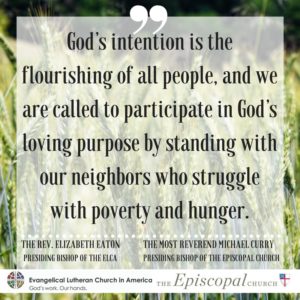As disciples of Jesus Christ and citizens, we are immensely concerned about the federal budget. Increases, decreases, and delays in the budget affect all Americans and people around the globe, particularly the most vulnerable members of our society. We  commit ourselves as a church to “pursuing policies and practices that will lead to sufficient, sustainable livelihood for all.”[1] This includes educating ourselves and speaking up about the priorities and implications of the appropriations process.
commit ourselves as a church to “pursuing policies and practices that will lead to sufficient, sustainable livelihood for all.”[1] This includes educating ourselves and speaking up about the priorities and implications of the appropriations process.
What is the federal budget?
The federal budget is comprised of 12 spending bills for each federal agency. Congress goes through a lengthy process to draft, revise and finally vote on the bills that will then be enacted into law. These bills fund many programs that address the government’s response to the environment, refugees, immigrants, poverty, criminal justice, healthcare, international assistance, housing, and defense. Congress needs to have completed the process of voting on the final bills by October 1, when the new fiscal year begins.
Why should we care?
As Lutherans, we affirm that governmental structures are an important way God is active in the world for justice, peace and stability. Governing leaders are to be held accountable to God’s purposes: “May [they] judge your people with righteousness and your poor with justice…May [they] defend the cause of the poor of the people” (Psalm 72:2) .”[2] As members of the ELCA, we affirm our responsibility to hold our government and elected officials accountable to a budget that promotes the common good of all.
Where the process stands
On Tuesday, May 23rd, The White House submitted its budget proposal to Congress. Congressional leaders have largely signaled that they will move ahead with their own budget drafting process. An arduous road lies ahead as Congress tries to work on bipartisan support for the federal budget. The month-long August Recess and the number of legislative work days, are dwindling. This signals that it may be hard for Congress to pass the budget by October 1st.
What happens if the budget doesn’t pass?
If Congress fails to pass all 12 spending bills they will likely pass a ‘continuing resolution’(CR). While giving Congress extra time to finish the remaining bills, CRs keep spending flat across ALL government programs. The consequences often affect the most vulnerable members of society, but even the more affluent can experience economic stagnation. Failing or stalling to pass the federal budget hurts the wellbeing of our nation and most affects members of our community who live in poverty.
Please join ELCA Advocacy in urging members of Congress to pass a federal budget that works to support the following programs that reflect our values that are grounded in love of God and neighbor.
How the Budget will Affect our Policy Areas:
Care for Creation: The programs currently in place at federal energy and environmental agencies are vital for protecting those who are most vulnerable. The proposed drastic budgetary cuts would result in significant reduction to the elimination of these programs. There would be curtailment in needed research to address environmental harm and to increase the use of renewable energy sources. Such reduction would stymie the current economic growth in job creation associated with renewable energy; and negate the progress the U.S. has made in being a global leader in addressing environmental harm and for providing for future generations.
Food Security and Healthcare: The budget proposes $193 billion in cuts to the Supplemental Nutrition Assistance Program (SNAP, formerly known as food stamps) over the next 10 years. These cuts would slash SNAP by an unprecedented 25 percent, dismantling a proven and effective program that provides working families and children nutritious food in difficult life circumstances. The budget also cuts $800 billion from Medicaid, $21 billion to the Temporary Assistance for Needy Families program; and a $40 billion reduction to the Earned Income Tax Credit and Child Tax Credit. These and other programs form a common contract Americans have with each other to ensure that we protect the most vulnerable among us.
Foreign Assistance: With 30 million people in Africa and the Middle East facing starvation, 50 million in need of immediate food assistance, and more than 65 million displaced, President Trump’s proposal to cut a third of the foreign assistance budget comes at a time when the need for it could not be greater. Foreign assistance funds provide life-saving health, economic, education, and food assistance to the most marginalized people in developing countries, and help prevent conflict and spread of deadly pandemics. If enacted, the proposed cuts will have devastating consequences on the most vulnerable populations around the world.
Housing: Many of the federal investments made in housing help revitalize struggling communities, rebuild after disasters, and give the people in the direst need the chance to seek better opportunities in an affordable home. Harsh cuts in the budget can increase the already staggering levels of housing poverty across the country, and make it a challenge for churches and service groups striving to end homelessness in their communities.
Immigration/Migration: The budget plays an important role in how immigration policy is implemented and how the U.S. addresses the root causes of displacement in Central America. Budget increases for immigrant detention and deportation fail to account for the pressing need for updated immigration policies, separates families, and create a climate of fear among our communities. These budget increases coupled with cuts in U.S. aid that address the root causes of displacement leave more children and families more vulnerable to human rights violations.
[1] Social Statement, ”Sufficient, Sustainable Livelihood for All” (1999) p. 17
[2] Social Statement, “Sufficient, Sustainable Livelihood for All” (1990) p. 11
